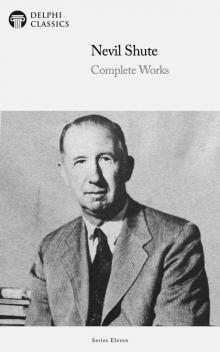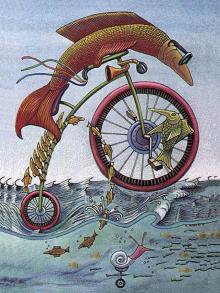- Home
- Nevil Shute
An Old Captivity Page 5
An Old Captivity Read online
Page 5
“Yes, sir.” The pilot hesitated. “There’s one thing that I’m a bit worried about.”
The grey eyes of the manufacturer fixed his own. “Well, what’s that?”
Ross said: “His daughter seems to be very much against the flight. She had a talk with me about it this morning.”
“Alix? What’s it got to do with her? What’s she got against it?”
“She thinks her father is too old to go off on a trip like that.” The pilot hesitated. “I thought you’d better know the way she feels.”
The manufacturer gave a snort. “Too old? I never heard such nonsense in my life. That girl wants a good whipping—that’s what she wants. Too old! Has she said that to my brother?”
“I really couldn’t say.”
“You don’t want to pay any attention to that. Is there any reason, in your view of it, why my brother shouldn’t go?”
Ross considered before answering. “I don’t think so,” he said at last. “There’s a certain risk in flying so far over the open sea, of course. I should go by Reykjavik; that splits it up into two hops of about six hundred miles each over sea. But flying down the coast of Greenland ought to be all right if we wait and pick a decent day for it, and when we get to this place Brattalid we make a camp and operate from there quite normally. At least, that’s how I see it at the moment.”
Sir David nodded. “My brother has had good health all his life. He’s fifty-eight years old. Are you afraid of trouble if you take him with you.”?
“Not in the least.”
“Of course not. Too old!” He sat brooding at his desk for a moment. Then he shot a sidelong glance at Ross. “He’s three years younger than I am.”
The pilot could not think of anything to say to that.
The manufacturer turned to the secretary. “Twelve thousand, Hanson?”
“Yes, Sir David. That was the outside figure—it includes the whole cost of the machine. It should come out a good deal less.”
The older man scrutinised the list of figures for a moment, then turned back to Ross. “It’s a lot of money. You’ll have to show results for that amount of money.”
The pilot shook his head. “I wouldn’t take this job if I had to guarantee results, sir. It’s too unusual. I’ll do my best, and in my judgment we can get the photographs Mr. Lockwood wants without much difficulty. But we may run into sheer bad luck.”
“I don’t want you to take more risks than are essential to the job. Especially if my brother’s going with you.”
Ross nodded. “It should be quite all right. But if it’s not, I shall play for safety first. In that case, we may spend the money and show no results—this year, at any rate.”
The manufacturer looked at him closely, weighing him up. At last he said: “Well, we’ll let it go at that. Mr. Hanson’s going to check up on your references. If those are satisfactory, he’ll write you a letter of engagement on the terms you want. You’ll have to fix up with Hanson and my brother the conditions for your bonus.”
He got up from his desk. “All right. I shall be seeing more of you, I expect.”
Ross said: “I’ll do my best to get this through all right, sir.”
“You’d better. Don’t pay any attention to that silly girl. I’ll sort her out at the week-end.”
He paused, standing erect behind his desk. “I offered Cyril twenty-five thousand for his research six years ago,” he said. “He hasn’t taken a thousand yet. I hope this means he’s come to realise that money’s meant to be used.”
Ross left the room with Hanson. In the outer office he turned to the secretary, and said:
“We shall have to hop around now, Mr. Hanson, if we’re going to get through in time. How soon can we start and order the machine?”
The secretary looked down his nose. “To-day is Friday. If all goes right, we should be able to engage you definitely on Monday, Mr. Ross. After that, you can make a start.”
“All right. I’m going back to Oxford now to see Mr. Lockwood. Over the week-end I’ll make out a programme of what we’ve got to do. Unless I hear from you to the contrary, I’ll be back here on Monday morning.”
The secretary smiled. “I should be ready for you by that time. But you’ve got six weeks, or more. A day or two won’t make much difference.”
The pilot said: “That’s just where you go wrong, Mr. Hanson. If we get that machine delivered, shipped and erected in this country, ready to start, six weeks from now, we shall do damn well. I don’t believe it can be done that quickly. But that’s when we’ve got to have it. If we don’t get that order placed on Monday you can call the whole thing off.”
The secretary nodded. “I see what you mean. I’ll talk it over with Sir David.”
Ross left the works, and was carried swiftly in the works car to the station. He caught the next train back to Oxford. He got there at about nine o’clock at night, and rang up Lockwood from a telephone booth at the station.
The don said: “I have had a long talk with my brother on the telephone, Mr Ross. Would you care to come and spend the night again? That’s fine. Come along now.”
Ross took a taxi to the house in Norham Gardens; the job seemed sufficiently secure for that expenditure. He was very tired; before meeting Lockwood he made an excuse to the parlourmaid and went and washed his face. Then he went to the study; the don was there with his daughter. Lockwood got up from his desk and came to meet him; the girl remained in her deep chair, reading her book.
Lockwood said: “You seem to have a made a good impression on my brother, Mr. Ross.”
The pilot smiled. “I’m very glad to hear it. I had a long talk with his secretary before I saw Sir David.”
“You mean Mr. Hanson? He’s been with my brother a long time. He helps me a great deal with my income-tax.”
They talked about the expedition generally for a time.
“I’ll have a look at the route over the week-end,” said Ross. “The machine will have to be shipped to Southampton. I’ll get it erected somewhere on Southampton Water. Then we’ll have to go to one of the places in the north—Scotland—Oban, or somewhere like that. From there to Reykjavik in Iceland must be eight or nine hundred miles—we’ll have to make that in one hop. From Reykjavik to Angmagsalik is five or six hundred, I believe, and about the same from Angmagsalik to Julianehaab. But I’ll have to look it all up—I’m only speaking from memory. We’ll have to have radio for a trip like that. That’s another thing.”
“I suppose so,” said Lockwood vaguely. “Tell me, are there any hotels at these places, do you think?”
The pilot shook his head. “There won’t be anything at Angmagsalik or Julianehaab.”
“Where should we sleep?”
“Oh, there’s bound to be a Danish family who’ll take us in. I don’t think we shall have to camp until we get to this place Brattalid.”
He glanced at Lockwood. “Does anybody live at Brattalid?”
“I really couldn’t say. I believe it’s quite deserted.”
Ross nodded slowly. “It looks as though we’ll have to depend entirely on ourselves.” He thought about it for a minute or two. Seventy miles from anything, right up near the Arctic Circle. He would have to be very thorough in his plans for camp equipment and provisions.
He said: “Sir David seemed very anxious that everything should be done properly. It’s rather a relief, that.”
Lockwood asked: “Done properly—in what way?”
“I mean, he realises that the trip is going to cost a good bit of money. He wouldn’t hear of buying a second-hand ship.”
The don frowned a little. “How much is it going to cost, Mr. Ross?”
Ross said: “It’s a bit difficult to say, at this stage. Your brother gave me a limit of twelve thousand pounds.”
In the far corner of the room, in her deep chair by the fire, the girl dropped the book that she had been pretending to read. She turned and stared at the two men.
“Twelve thousand pounds!” s
he cried.
The pilot turned and looked at her. “Sir David gave me that as the outside figure that he was prepared to spend,” he said. “Actually, it won’t come to anything like that unless we get some real bad luck. If everything goes well, by the time we’ve sold the machine second-hand and cleaned it all up, I daresay it will have cost six or seven thousand.”
“But that’s a small fortune! It can’t possibly cost anything like that amount!”
The pilot’s lips tightened; he was very tired. “I’m afraid it can, Miss Lockwood. We shall probably drop three thousand selling the machine second-hand, as a start. Shipping it from Detroit to Southampton will cost about three hundred. Fuel and oil may cost another four hundred, by the time we’ve got it shipped to Greenland. I’m not quite sure about the cost of the photography—something between a thousand and fifteen hundred pounds by the time that the mosaic is made up. We shan’t be far off the figure that I said.”
The girl said: “It’s perfectly fantastic!”
Ross sighed. “I’m sorry, but that’s what aircraft cost to run, Miss Lockwood.”
The girl got up from her chair and came over to the desk. There was an air about her that reminded Ross immediately of Sir David. “Daddy,” she said, “this wants looking into a bit more. Isobel told me that she flew to Rome the other day for fifteen pounds, and I believe that’s further. It can’t possibly cost this amount of money. Don’t make any decision to-night.”
The don glanced at Ross. “It seems to have gone up a good deal,” he said mildly. “You told me four thousand yesterday.”
In his fatigue, depression closed down on the pilot. “That was reckoning on a second-hand aeroplane,” he said. “But your brother won’t hear of that. If he’s got the money to spend, I think he’s quite right.”
Lockwood said: “Ah—yes, I had forgotten that. I suppose you lose more money when you’re selling a new machine than when you’re selling a second-hand one.”
“Certainly. It’s like a motor car.” He paused. “With the slump that’s on in Canada, the price of a second-hand ship is very low. It makes a lot of difference.”
Lockwood nodded. “I quite understand.”
The girl burst out: “But, Daddy, Uncle David can’t possibly go spending thousands of pounds in this way. Think what that money would mean to them down at the Mission!”
The pilot came to the conclusion that he had had about as much as he could stand. He got up from his chair. “I’m a bit tired,” he said. “Would you mind if I went to bed now? We can go on with this in the morning.”
Lockwood looked with irritation at his daughter. He wished that she had kept out of it. He knew instinctively that the pilot was in the right in this contention, that Alix was making a fool of herself. He wanted to spend the rest of the evening with Ross making plans for the expedition; at the same time, he could hardly discipline his daughter in front of this young man. Besides, the pilot might be really tired. He said:
“By all means, Mr. Ross. You know the way to your room. We’ll go on with our arrangements after breakfast.”
The pilot nodded. “We shall be fresher then. After that, I must get back to London if we’re going on with this. Good night, Mr. Lockwood—don’t get up.” He passed the girl and nodded to her coldly. “Good night, Miss Lockwood.”
He went up to his room, undressed moodily, and got into bed. The job did not appear to be so very safe, after all. It was all right except for that infernal girl. He hoped that she’d marry a commercial traveller, and have triplets. Keep her quiet. But no commercial traveller would look at her. A little bitch, with ugly clothes and with an ugly mind. To hell with her.
He slept.
In the study below Alix faced her father. “I know you’re cross with me, Daddy,” she said quietly, “but I can’t help it. I’m quite sure there’s something wrong here. It can’t possibly be necessary to spend all those thousands of pounds.”
Lockwood said irritably: “My dear, your uncle has built up a very big business, and he’s got a very good business man as his secretary. Don’t you think we might leave the money side to him? After all, it’s their money. If you’re afraid that Mr. Ross is trying to cheat them, you can set your mind at rest. He’ll be a clever man if he gets anything past Hanson.”
The girl said: “I know, Daddy. But the whole thing is being so rushed. Don’t go any further with it to-night. Is Uncle David coming down to-morrow?”
“Yes. He’ll be here in the evening.”
“Daddy, how much is Mr. Ross going to make out of this expedition? How much are you paying him?”
Her father said: “I really don’t know. David said that they’d fixed up terms with him, but he didn’t say what they were.”
She stuck her chin out. “Well, I’d like to know.”
“My dear, he’s got to earn his living, like everybody else.”
“I know, Daddy. But he’s in such a hurry to rush us into this, and there’s really no hurry at all. It’s over ten weeks before you want to be there, on the first of August. I know you’ve got to get there, but Isobel flew further than that in one day when she went to Rome. It all makes one smell a rat.”
Lockwood faced his daughter. “Do you think he’s a rogue?” he asked directly.
She hesitated. “No … I don’t quite think that. But I think he wants this job very badly, and he’s trying to rush you into it.”
There was a long silence after she said that. Lockwood, for all his years, was still the victim of an in feriority complex. He knew himself to be a good lecturer, a useful member of his college, a fine classical scholar, and a brilliant archæologist. With these accomplishments, he was a child in business and in money matters, and he knew it. He knew it much too well. Various sad experiences as a younger man had shown him that he could be imposed upon, and he had accepted the position with docility.
He said doubtfully: “I’m not sure that you’re right, Alix. I like him very well.”
“I know, Daddy. But that doesn’t alter the fact that he’s hoping to get a job out of you.”
He said: “All right, my dear. We’ll wait and talk it over with David when he comes.”
She said, a little hesitantly: “It’s going to be a terribly difficult expedition, anyway. You couldn’t go back to Crete, I suppose?”
“Crete?” He stared at her. “Don’t talk so foolishly. Nobody’s going to Crete. The work is in Greenland.”
She said no more.
Ross got up in the morning worried and upset. It seemed to him that the Lockwoods had got to realise that flying aeroplanes to Greenland cost a lot of money. Unless they were prepared to face that fact he would do better to wash his hands of it, go back to his aunt at Guildford, and scratch about for something else to do. A flight like that could only be done at all if money were no object, particularly in the time.
He went down moodily to breakfast. After the meal he went with Lockwood to the study. The don said: “David is coming here this evening, Mr. Ross. What are your movements?”
The pilot smiled. “I see that you’re not quite decided on this thing,” he said. “I think I’d better get back to London. I can start to look up points about the route and the formalities, although it’s Saturday. I’ve arranged to go to Coventry on Monday morning unless I hear from them to the contrary. We’d better stick to that arrangement. By that time you’ll know more about it.”
Lockwood nodded. He was a little ashamed of his vacillation; in the cold light of morning he could not quite see why he had agreed to hesitate. Moreover, he liked the young man, and he realised that the uncertainty was making a bad start for the adventure, if it was to come off. Still, Alix was probably right; it would be better not to rush things.
He said: “I think that’s wise. My brother will be here this evening, and I’ll have a talk with him. We shall be able to make a definite decision one way or the other then. Are you on the telephone, Mr. Ross?”
The pilot hesitated. “I’m afraid I’m not. I�
��ll give you my address at Guildford; a telegram will get to me.”
“That will do perfectly. I will wire you if there’s any change in the arrangements.”
Ross went back to London, half convinced that the girl had killed his job stone dead. He went first to the Guild of Air Pilots; from there he went to the aeronautical department of the Automobile Association. He spent all afternoon there, plotting his route and examining the records of previous flights to Greenland. Later in the afternoon he tried to get in touch with a fuel company upon the telephone, but it was Saturday afternoon and he had no luck.
In the evening he went down to Guildford. He leaned against the kitchen wall, his hands thrust deep into his trouser pockets, and told Aunt Janet all about it. She heard him to the end in pawky silence.
“It’s a terribly costly piece of research,” she said at last. “The lassie’s got the right idea of it, to my way of thinking.”
The pilot shrugged his shoulders. “If they want survey made of that part of the world, that’s what it will cost them,” he said. “I can’t tell you if they really want it done or not. I think they’re drawing back a bit now.”
“And well they may,” said his aunt drily. “It’s a mighty lot of money to be spending at one go.”
She turned to him. “If they dinna want you, Donald, what else would you do?”
He shook his head. “I don’t know. I’ll have to find a job of some sort, soon.”
“Aye,” she said prosaically, “that’s a fact.” She got up and began moving about the kitchen. “Come on and help me lay the supper. Ye’ll do nae good with worrying.”
In Oxford the Bentley, driven by the well-disciplined, efficient young chauffeur in blue uniform, turned into Norham Gardens at about six o’clock and drew up at Lockwood’s house. The chauffeur sprang from his seat and came round to the door; Sir David heaved his heavy body up and got out. “You’d better wait a bit,” he grunted. “Give my bag to the maid.” He went forward into the house.
Ten minutes later he was lighting a cigar, seated alone with his brother Cyril in the study. “Well, how about the Arctic?” he said, heavily jocular. “Got your fur coat yet? Made all your plans?”

 On the Beach
On the Beach Slide Rule
Slide Rule A Town Like Alice
A Town Like Alice The Far Country
The Far Country Pied Piper
Pied Piper Round the Bend
Round the Bend An Old Captivity
An Old Captivity Mysterious Aviator
Mysterious Aviator The Breaking Wave
The Breaking Wave Marazan
Marazan Lonely Road
Lonely Road Pastoral
Pastoral No Highway
No Highway Stephen Morris and Pilotage
Stephen Morris and Pilotage Complete Works of Nevil Shute
Complete Works of Nevil Shute Most Secret
Most Secret Beyond the Black Stump
Beyond the Black Stump The Rainbow and the Rose
The Rainbow and the Rose The Chequer Board
The Chequer Board Trustee From the Toolroom
Trustee From the Toolroom Ordeal
Ordeal Stephen Morris
Stephen Morris